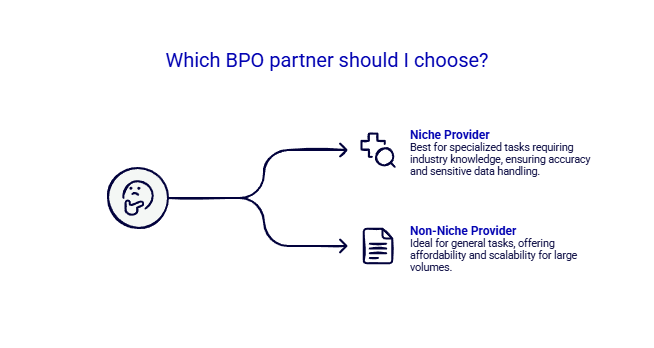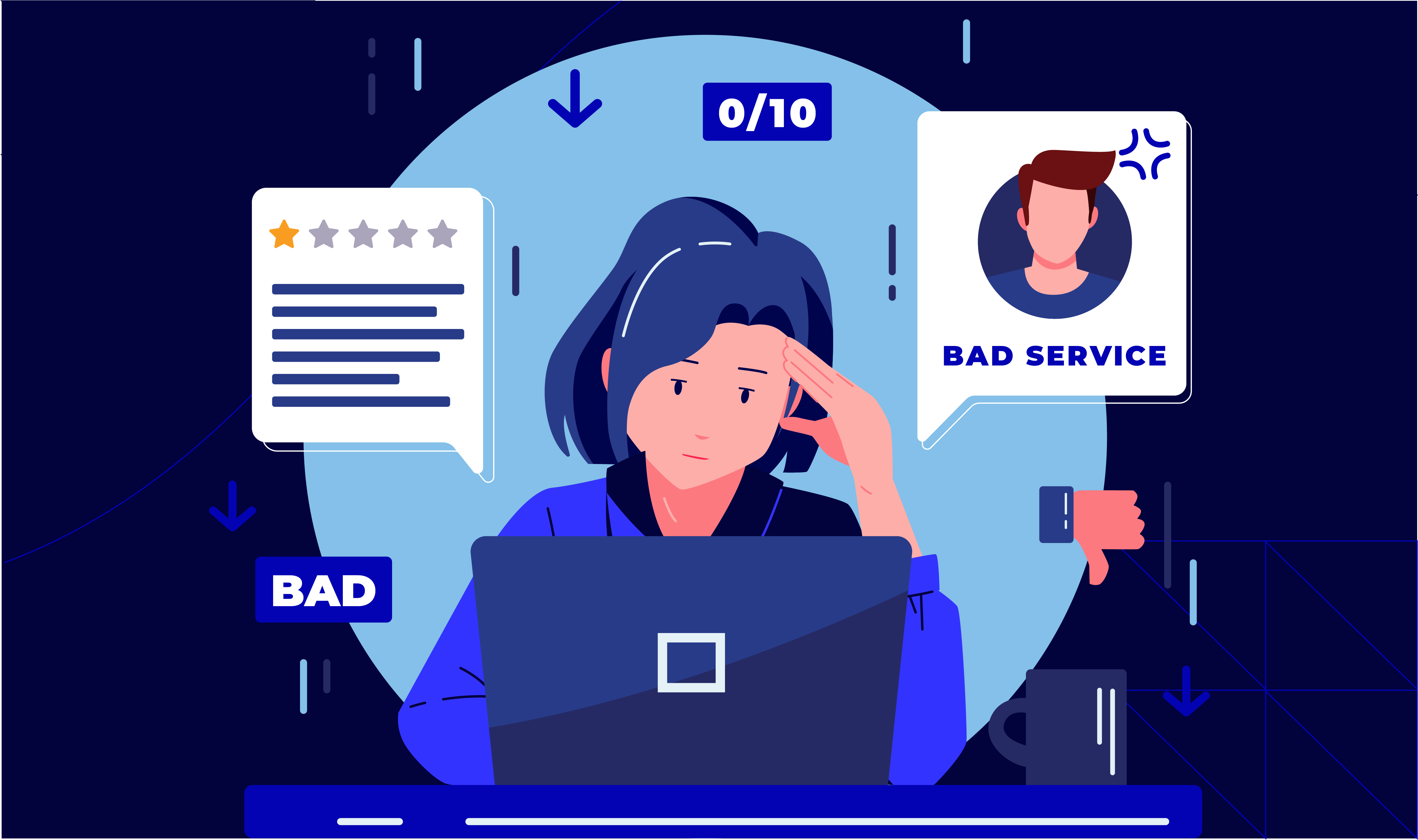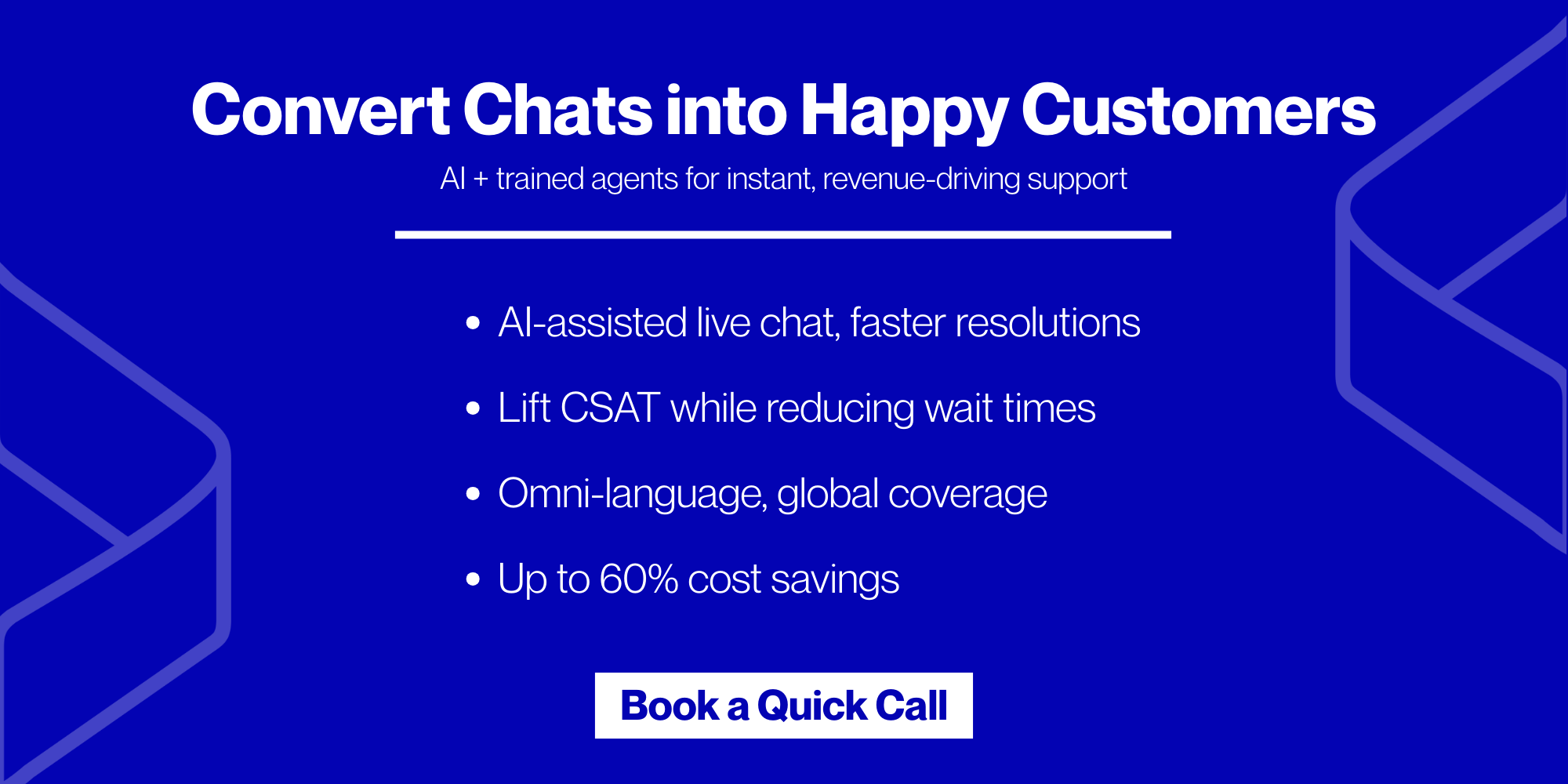A Business Process Outsourcing (BPO) partner in 2025 is a third-party service provider. It manages specific business functions on behalf of a company. These functions usually include non-core tasks like customer support, social media support, payroll, or data entry.
In 2025, outsourcing isn’t just a strategy for many high-growth companies, it’s a lifeline. For most businesses, it is a lifeline! But outsourcing to the wrong partner? That’s a shortcut to operational chaos!
However, when you choose the right Business Process Outsourcing partner in 2025, it boosts your business efficiency by taking over your non-core tasks, such as:
- Streamline customer experience solutions across chat, email, voice and social.
- Reduce operational costs by up to 60% compared to in-house teams.
- Data entry
- Payroll
- Scale quickly in competitive markets like the US, UK & Australia without sacrificing quality.
- Tech support
This lets your team focus on what truly matters – your core business! Also, through the right BPO partner, you can reduce costs and support your long-term growth.
However, the global BPO market in 2025 is expanding rapidly with many new players coming into the market. Studies show that in 2022, the total value of the global BPO industry was $312.21 billion. By 2027, it’s expected to grow to $374.75 billion and by 2032, it’s projected to reach $460.69 billion.
Due to such an abundance of BPO partners, making the selection is now even tougher. Need help? In this article, we will first understand what BPO outsourcing is and then study some best practices you can follow while you choose the right provider for sustainable success.
Who Should Read This Guide in 2025?
This guide is ideal for those seeking ways to improve support operations while cutting costs:
- CX and customer support leaders in consumer brands and D2C companies.
- VPs, Senior Managers and Directors overseeing operational efficiency
- A business in the US, UK or Australia scaling beyond 5+ employees and $5M+ in revenue.
- Businesses with 5+ employees and a revenue above $5 million seeking growth through strategic outsourcing.
What is Business Process Outsourcing (BPO)?

BPO means in 2025 delegating some of your company’s tasks to another company (called a BPO partner). Usually, these tasks do not pertain to your core business operations but still hold relevance.
For example,
- A SaaS company focused on software development might outsource 24/7 customer support to ensure global coverage.
- An e-commerce brand could partner with a BPO to manage order tracking, returns and social media engagement.
By doing so, you can save costs, reduce workload, and use better tools or skills that Business Process Outsourcing partners offer. Studies show that about 65% of companies outsource to focus on core functions, while 63% do so to reduce expenses. Initially, BPO started in the manufacturing sector to manage supply-related tasks. But today, it is used in all industries:
- Healthcare
- Finance
- Energy
- Online shopping
Now, please note that BPO is of two main types:
| Back-office BPO | Front-office BPO |
This includes inside tasks such as:
|
This includes direct customer tasks such as:
|
How to Choose the Right BPO Provider For Your Company?

BPO spending is expected to grow at a rate of over 9% annually through 2030. As cited by about 70% of businesses, cost reduction remains the primary reason for outsourcing.
However, to gain the most, you must choose the right Business Process Outsourcing partner. It ensures better service delivery and long-term savings. They deliver quality, compliance and customer loyalty. Below are some best practices following which you can choose the right BPO provider for your company:
1. Learn About the Provider’s Outsourcing Model
Outsourcing companies work in different ways depending on your business needs. You must choose between onshore, offshore or hybrid outsourcing depending on:
- Goals
- Team’s capacity
- Customer’s expectations
Most BPO partners follow these three main types of outsourcing models:
A) Onshore Outsourcing
You give work to a company located in your own country. It is easier to talk, meet in person, and follow the local rules. An onshore BPO partner is a good option if:
- You need to avoid language or cultural issues.
- You don’t want delays caused by different time zones.
- Your work involves sensitive data that should stay within the country.
- You want domestic professionals with the required skills.
It may not be ideal if you are looking for cheaper labour or multilingual staff. Industries like healthcare often choose this model because it is easier to meet local rules and standards.
B) Offshore Outsourcing
You give work to a BPO partner in another country. It works best when:
- You want to lower costs for tasks like coding, customer service consulting, or data entry.
- You need people with specific technical skills that are hard to find locally.
- You want to scale your team up or down based on project needs.
- Your projects don’t require constant meetings or real-time communication.
Please note that this model is not suitable for short-term projects. That’s because it takes time to build the partnership and train the team.
C) Hybrid Outsourcing
This is a mix of your internal team and an external provider. You keep control of key parts and outsource others. This model helps when:
- Your project has many stages or needs different skills.
- You want to use local teams for planning and outsource technical parts to save cost.
- You need expert help temporarily to support your internal staff.
But be careful! In most cases, it has been observed that managing both internal and external teams causes confusion. It sometimes leads you to choose the wrong pricing plan which increases costs.
2. Choose a Provider from the Right Tier
Usually, BPO partners are grouped into three tiers based on:
- The kind of services they offer
- Their size
- Their experience level
By choosing the right tier, you can avoid paying for services you don’t need. Let’s understand these three tiers now:
Tier 1 Providers
These are large companies with:
- Multiple services
- Global clients
- Advanced tools
They are best for conglomerates and mature businesses with complex needs and large budgets.
Tier 2 and Tier 3 Providers
These are smaller outsourcing partners. They only focus on specific services and serve small or medium-sized businesses. Often, these companies charge less and are more flexible.
Tips for Picking the Right Tier
- Know Your Needs Clearly
-
-
- Understand what your project needs.
- Don’t overestimate or underestimate the work.
-
- Look Beyond Costs
-
-
- Choose a BPO partner that can grow with your business and support your long-term goals.
- Choose a BPO partner that can grow with your business and support your long-term goals.
-
- Check Their Track Record
-
- Read client feedback and reviews.
- This allows you to confirm if the provider fits the tier they claim.
Don’t just pick the biggest name. Ensure the partner’s tier and size fit your operational goals.
3. Make a Choice Between Niche and Non-Niche BPO Partner

A niche service provider focuses on a specific industry or specialised type of work. This kind of BPO partner has deep knowledge of the industry’s rules and common challenges. In contrast, a non-niche provider offers general services without any specific industry focus.
When to Choose a Niche Provider?
Choose a niche provider if your work involves specialised tasks. For example,
- In healthcare data entry, a niche provider understands:
- Medical terms
- Patient data formats
- This leads to fewer mistakes and better handling of sensitive data.
When to Choose a Non-Niche Provider?
Choose a non-niche provider if the work does not require special knowledge. For example,
- Say the task is entering general customer data.
- Now, any general outsourcing partner can handle it.
In such cases, a general provider is more affordable. Also, with them, it is easier to scale for large volumes of basic tasks.
How to Decide What You Need?
- Check your project
-
-
- Choose a niche provider if your work involves specialised rules or industry knowledge (like legal, finance, or healthcare),
-
- Know your industry
-
-
- Some fields require specific compliance or technical skills.
- If yours does, a general provider may not be the right fit.
-
- Compare providers
-
- Look at their past work.
- See if they’ve handled similar projects.
- Ask for references or case studies.
How to Know if a Business Process Outsourcing Partner is Niche?
- Look at their website and check if they mention working with your type of business.
- See if they have special approvals or work with professional bodies in your industry.
- Check if they attend trade shows or speak at industry events.
- Ask direct questions about your industry and see if they understand your challenges.
Ask: Do I need specialized compliance and accuracy or scalable general support?
4. Carefully Analyse the Outsourcing Cost
Outsourcing can save costs! However, you must ensure the price you are paying matches the quality of the service. Please note that most BPO partners nowadays offer tiered pricing, where higher prices are supposed to mean better service.
Thus, you should check if the service at each price level is worth it. Let’s see how you can do this:
-
- Market Research
- Compare prices from other BPO partners offering the same services.
- This gives you a fair idea of the market rate.
- Market Research
- Request Details
-
-
- Ask for clear proposals from providers.
- These should explain:
- What services are included
- What service levels are offered
- What each tier costs
-
- Check for Flexibility
-
-
- Be aware that higher-priced tiers should offer:
- More features
- Extra support
- Ability to scale services when needed
- Be aware that higher-priced tiers should offer:
-
- Beware of Very Low Prices
-
- Unrealistically cheap providers can mean poor quality or hidden charges.
- Some new BPO partners may offer low prices to attract clients.
- Thus, ask more questions before signing anything.
5. Ask About Their Change Management Strategy
Outsourcing partners must be able to handle changes. This is usually done via a change management strategy. It allows them to deal with unexpected events like staff shortages or new rules.
Why Does It Matter?
If something changes in your business, or an emergency happens, the BPO partner should be able to keep services running. Follow these tips to make an assessment:
- Ask About Experience
-
-
- Find out if they have handled sudden changes before.
- Ask for examples.
-
- Check Their Resources
-
- Make sure the BPO partner has the people, tools, and systems to manage change.
- Ask for References
-
-
- Speak to past clients to see how the provider handled changes.
- Speak to past clients to see how the provider handled changes.
-
- Talk About Flexibility
-
-
- Ask how they will manage if things go off plan.
- What do they do if there are delays or increased work?
-
- Review Their Plans
-
- Check any change-related documents they provide.
- Make sure their plans match your business needs.
Ask for client references or case studies of how they managed disruption. For example, Atidiv helped a UK retail client handle 230,000+ tickets annually, saving $500K.
Tired of BPO Search? Trust Atidiv! We are an Agency with 15+ Years of Expertise.

Choosing the right BPO partner for your company is a strategic decision. It directly affects your company’s:
- Growth
- Efficiency
- Bottom line
A reliable BPO provider doesn’t just take over tasks! They become a strategic extension of your team and let you focus on core operations.
Are you looking for a reliable BPO partner with 70+ global clients, a 98% QA score, up to 60% cost savings and a 4.8 CSAT rating? We at Atidiv have a strong 15+ years of experience!
Our expert team offers a wide range of solutions, such as:
- Back office support services like payroll, accounting, and data security.
- Front-office support such as 24/7 customer service, social media, and SEO
Case in point: Atidiv saved $1.3M annually for a U.S. tire retailer by optimizing customer support operations.
For CX leaders in consumer brands and D2C companies across the U.S, U.K & Australia, we help you scale customer support without sacrificing quality.
We have expertise across 20+ industries. Choose Atidiv today to drive your business forward with confidence!
FAQs on BPO Partners
1. How do I know if my business is ready to outsource?
It may be time to outsource if:
- Your team is overloaded
- Operational costs are rising
- Service quality is suffering
Through outsourcing, you can focus on your core areas. At the same time, experts of hired BPO partners handle routine or time-consuming tasks.
2. Will I lose control over my business operations if I outsource?
Not at all. A good BPO partner works alongside your team, not around it. Still, you can:
- Set goals
- Track performance
- Get regular updates
Remember that in outsourcing, you make all the decisions. A BPO partner just lets you execute them better!
3. How can I be sure the BPO partners will keep my data safe?
In India, BPOs must follow strict data security measures. The Data Protection Bill mandates rules like:
- Data localisation (storing data within India)
- Consent-based data usage (getting explicit permission to use data)
Additionally,
- BPO companies use advanced security protocols such as encryption (encoding data) and employee training to avoid data breaches.
- They also comply with GDPR and local data protection laws to protect sensitive information.
Atidiv uses advanced encryption, data localization and employee training to ensure compliance and security.
